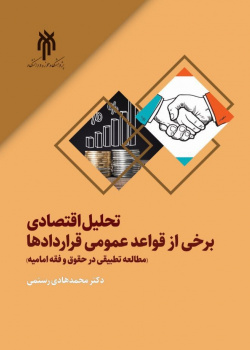



تحلیل اقتصادی برخی از قواعد عمومی قراردادها
Economic analysis of some general rules of contracts
اسلام آیین تکامل است و به تکامل مبانی و شروط قراردادها در راستای افزایش کارایی، رضایت طرفهای معامله و رفاه جامعه فرا میخواند. از همین رو کتاب حاضر بر تکامل قواعد حقوقی و اقتصادی در اسلام و نظام حقوقی آمریکا که به کارایی و رفاه جامعه میانجامد تمرکز دارد. اصولی چون قواعد تکمیلی، شفافسازی اطلاعات و آزادی قراردادی، به افزایش کارآمدی قراردادها کمک میکنند. در اسلام، افشای عیوب پنهان واجب است و آزادی قراردادی، افراد را قادر میسازد تا منافع خود را بهتر تأمین کنند. قرارداد کامل، تعهدات کارآمد برای شرایط آینده را پیشبینی میکند، در حالی که قرارداد ناقص گاهی به دلیل کاهش هزینههای مذاکره، کارآمد است. کتاب پیش رو به بررسی مؤلفههای کارآمدسازی قراردادها، تأثیر نگرش اقتصادی بر قواعد عمومی قراردادها، مصادیق کارآمدسازی قراردادها و توجیه اقتصادی نقض کارآمد قراردادها میپردازد. همچنین، تحلیل اقتصادی قواعد فقهی، ممنوعیتهای شرعی و حرمت ربا را در روابط اقتصادی مورد بررسی قرار میدهد
Mohammad Hadi Rostami, Ph.D
slam is a religion of evolution and calls for the evolution of the foundations and terms of contracts in order to increase efficiency, satisfaction of the parties to the transaction and welfare of the society. Therefore, this book focuses on the evolution of legal and economic rules in Islam and the American legal system, which leads to the efficiency and welfare of the society. Principles such as supplementary rules, information clarification and contractual freedom help to increase the efficiency of contracts. In Islam, disclosure of hidden faults is obligatory and contractual freedom enables people to better secure their interests. Complete contract provides efficient obligations for future conditions, while incomplete contract is sometimes efficient due to reduced negotiation costs. This book examines the components of making contracts more efficient, the effect of economic attitude on the general rules of contracts, examples of making contracts more efficient, and the economic justification of Effective breach of contract. Also, economic analysis of jurisprudence, examines Shariah prohibitions and the illegitimacy of usury in economic relations
